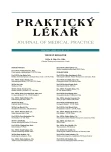-
Medical journals
- Career
Probiotics from the view of the general practitioner – clinical indications for the use of probiotics, results a questionnaire study among general practitioners
Authors: D. Mazánková 1; S. Kotásková
Authors‘ workplace: Ústav aplikované farmacie, Farmaceutická fakulta Veterinární a farmaceutické univerzity Brno, Přednosta: doc. Ing. Jiří Dohnal, CSc., MBA 1
Published in: Prakt. Lék. 2011; 91(11): 640-644
Category: Reviews
Overview
Basic clinical indications for the administration of probiotics consist of prevention of
- intestinal dysmicrobia after ATB use,
- diarrhoea treatment, and
- prevention of travellers’ diarrhoea.
Another significant instance when probiotics are recommended is the treatment of piles, chronic infections of respiratory tract and chronic infections of urinary tract.
This text also shows the results of a questionnaire study about recommending probiotics by generals practitioners. The aim of this study was to determine the attitude of general practitioners towards probiotics. The survey showed that most of the respondents included in this project recommended probiotics to their patients. Concerning indications, the largest group of participants recommended probiotics as a prevention of intestinal dysmicrobia after ATB use. Other frequent indications were diarrhoea treatment and prevention of travellers’ diarrhoea.
The mostly prescribed probiotic was Hylak forte. Most of the generals practitioners asked patients during their following visit whether they actually used the recommended probiotics, so that they have feedback from patients. General practitioners’ main source of information on probiotics is corporate literature. Participants have good information about probiotics, but most of them would welcome more information on the issue.Key words:
probiotics, Bifidobacteria, Lactobacillus, clinical indication, questionnaire study.
Sources
1. Kohout, P. Přínos probiotik z pohledu internisty/gastroenterologa. Medical tribune 2008, 3, s. A8.
2. Číhal, M. Probiotika, prebiotika, symbiotika, Bez předpisu 2009, 1, s. 16-21.
3. Kligler, B. Probiotika. Medicína po promoci 2009, 10, 1, s. 49-53.
4. Juránková, J. a kol. Probiotika v gastroenterologii a hepatologii. Med. pro praxi 2007, 4, s. 156-160.
5. Krejsek, J., Kudlová, M. a kol. Nutrice, probiotika a imunitní systém II. Část: Nutrice, přirozená slizniční mikroflóra a individuální imunitní reaktivita. Pediatr. pro praxi 2007, 3, s. 156-162.
6. Kohout, P. Probiotika v rukou praktického lékaře. Medicína pro praxi 2009, 6,3, s. 135-139.
7. Niedzielin, K., Kordecki, H., Birkenfeld, B. A controlled, double-blind, randomized study on the efficacy of Lactobacillus plantarum 299V in patients with irritable bowel syndrome. Eur. J. Gastroenterol. Hepatol. 2001, 13, p. 1143-1147.
8. Salvatore, S., Keymolen, K., Hauser, B. et al. Intervention during pregnancy and allergic dinase in the offspring. Pediatr. Allergy Immunol. 2005, 16, p. 558-566.
9. Kudláčková, Z., Jílek, P. a kol. Probiotika v profylaxi a terapii nádorových onemocnění a vulvovaginitid. Interní Med. 2006, 3, s. 109-111.
10. Hronek, M., Kudláčková, Z., Nekvintová, J. Probiotika a prebiotika v profylaxi a terapii poruch GIT a v prevenci karcinogeneze Interní Med. 2009, 6, 2, s. 66-68.
Labels
General practitioner for children and adolescents General practitioner for adults
Article was published inGeneral Practitioner

2011 Issue 11-
All articles in this issue
-
Basics of cognitive, affective and social neuroscience.
XI. Social decision - Probiotics from the view of the general practitioner – clinical indications for the use of probiotics, results a questionnaire study among general practitioners
- Actinic keratosis: the facts about biological behaviour and clinico-pathological aspects of the disease from the view of pathologist
- Future of coordinated rehabilitation (complete, comprehensive)
- Pulmonary embolism and its diagnostic problems
- Risky and harmful alcohol consumption in young adults: social and demographic context
- Updated guidelines for the management of atrial fibrillation and its systemic arterial thromboembolic complications
- Faecal calprotectin
-
Basics of cognitive, affective and social neuroscience.
- General Practitioner
- Journal archive
- Current issue
- Online only
- About the journal
Most read in this issue- Faecal calprotectin
- Probiotics from the view of the general practitioner – clinical indications for the use of probiotics, results a questionnaire study among general practitioners
- Pulmonary embolism and its diagnostic problems
- Actinic keratosis: the facts about biological behaviour and clinico-pathological aspects of the disease from the view of pathologist
Login#ADS_BOTTOM_SCRIPTS#Forgotten passwordEnter the email address that you registered with. We will send you instructions on how to set a new password.
- Career

